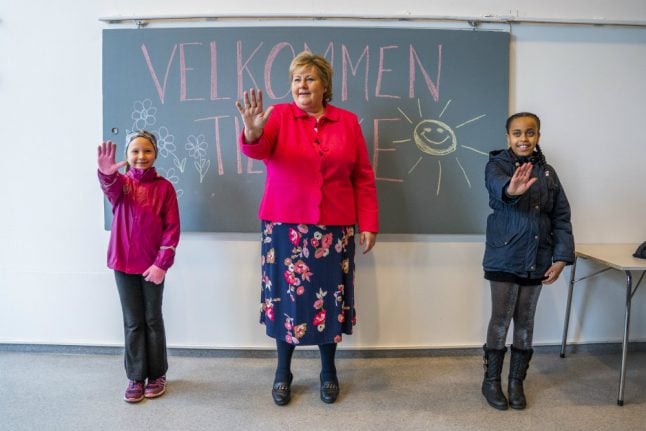Flanked by her education and family ministers, each respecting social distancing rules, Erna Solberg tried to assuage the fears of a generation longing for life to return to pre-Covid days.
“I hope that next year we will be able to start living a little bit more normally,” Solberg replied to a question from a class of eight- and nine-year-olds which had been sent in advance.
“In the meantime, we have to continue like this and look out for each other.”
Since the beginning of the pandemic, the leaders of the Nordic countries have all held question-and-answer sessions for children, initiatives hailed by child psychiatrists.
But none have persisted with the format as much as Norway: this is the third time since March that the three ministers have held a “press conference” solely for children's queries, broadcast live on television.
In the prime minister's official press room, the three ministers use simple language, without hiding any of their uncertainties, to answer questions collected by a children's programme and relayed by a moderator.
“Summer is over, children are back at school, their daily lives have changed and new questions have arisen, as well as the need to talk about the way forward,” Solberg explained to AFP in an email.
This time, the children's questions ranged from travel possibilities to playing football with other classes in the schoolyard, and when their grandparents living abroad would be allowed to visit them.
Asio, 12, wanted to know what Halloween was going to be like.
“You can celebrate Halloween, respecting the one-metre distance rule, knock on the door and dress up and have fun,” the prime minister assured him.
“Everyone just has to make sure the precautions are respected.”
Experts welcomed the effort directed at the young.
A French child psychiatrist, Daniel Marcelli, called it a “pretty good democratic initiative”.
“For kids over the age of seven or eight who have reached the age of reason, to be able to speak directly to the president, prime minister or an important figure — that's an important act of acknowledgement that fuels a sense of citizenship,” he told AFP.
Norway frequently organises political debates specifically for children ahead of elections.
“It's both a responsibility and an obligation that we have,” said Rune Alstadsæter, state secretary in the prime minister's office.
“The Convention on the Rights of the Child, in its article 17, says the state must ensure that all children have access to information,” he said.
In a sign of their popularity, the Covid-19 press conferences typically yield hundreds of questions.
“It's normal” for kids to probe virus policy, said psychiatrist Serge Tisseron. “It's the generation of tomorrow. They're very attentive to all this.”
“When you're 40 or 50 years old, you've experienced other things. But when you're 10, it's normal to wonder if it's going to continue like this,” he said.
At worst it's an “election operation”, at best a “lesson in democracy”.
But, according to Tisseron, in order to be truly beneficial, the press conferences should be preceded by a debate in school before the questions are asked.
Either way, there's usually something for everyone.
“Children ask questions very directly and without any complexes,” said Marcelli. “Often the answers can be just as interesting for adults.”
READ ALSO: How the Nordic welfare model helped cushion the economic fall



 Please whitelist us to continue reading.
Please whitelist us to continue reading.
Member comments